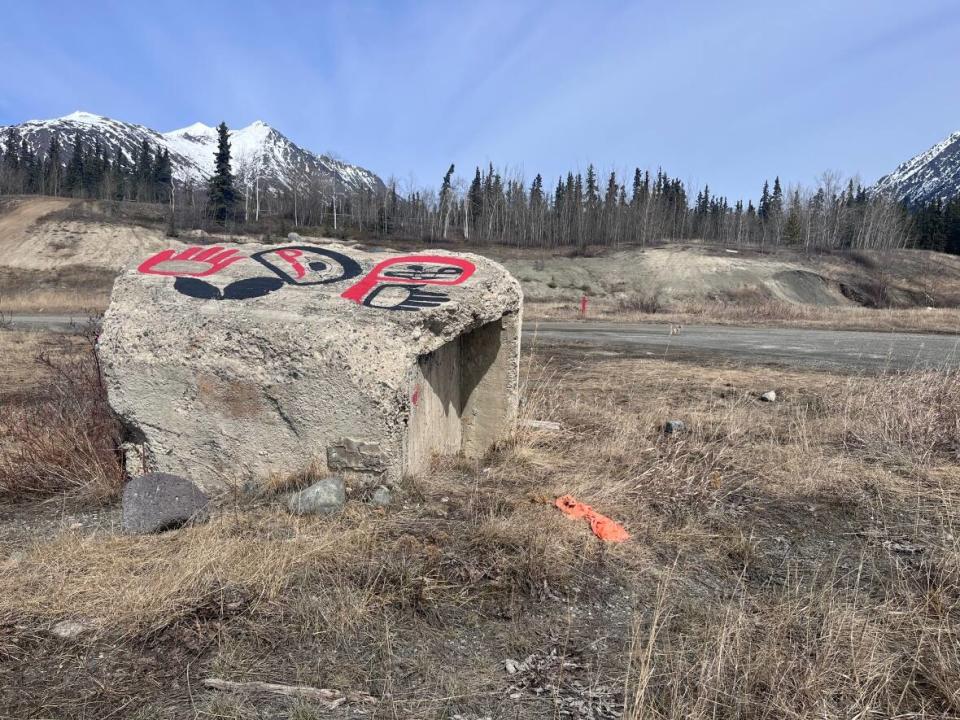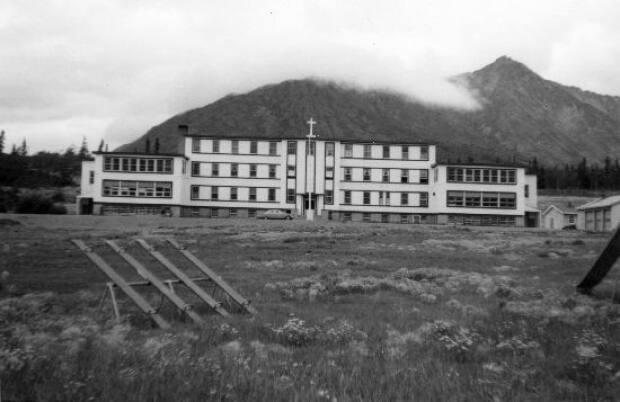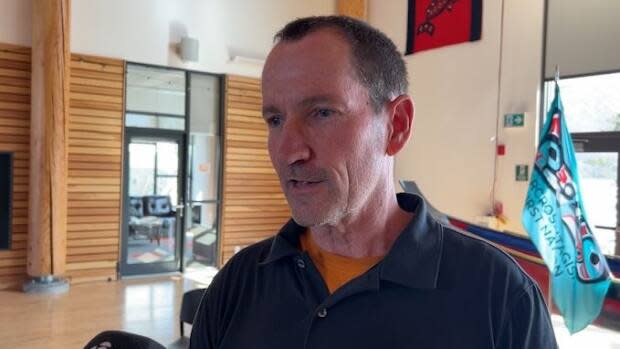Details of upcoming work to find graves at residential school site presented in Carcross, Yukon

WARNING: This story contains distressing details.
People in the community of Carcross, Yukon, received more details this week about the upcoming work to search for unmarked graves at the site of a former residential school.
That work, which will be done using ground-penetrating radar and other tools to identify possible grave sites, is set to begin in early June with some results expected by the end of summer.
"What we wanted to do was come in here and make sure they were completely aware of what our plans are," said Adeline Webber, who chairs the Yukon Residential Schools Missing Children working group, on Thursday in Carcross.
The working group, along with the geotechnical firm who's been hired to do the work, met with the chief and council of the Carcoss/Tagish First Nation and other community members, to answer questions and ask for input into how the work is done.
"Cultural protocols are really important," Webber said. "Whatever the cultural protocols are — it's up to them to tell us what it is. We won't take that over, it's up to them," Webber said.

The original Chooutla Indian Residential School was built in Carcross in 1911 and the facility — which had been later rebuilt — was finally shut down in 1969. The building was demolished in 1993 and the site now sits empty.
The Anglican Church ran the school, and students were sent there from across Yukon, the N.W.T. and northern B.C. At least 20 Indigenous children died at Chooutla over the years, according to the Truth and Reconciliation Commission, though the local working group has said the number could be as high as 42.
The group has received funding from both the territorial and federal governments to do the work. It was announced in 2021, a year after the Tk'emlúps te Secwépemc First Nation announced it found the potential remains of children at the former Kamloops Indian Residential School.
The federal government has committed $495,000 to the project, with the Yukon government contributing $595,000. The goal is to start with the Chooutla site, and then later look at other former school sites in Whitehorse, Dawson City and at Shingle Point.

Webber said a lot of preliminary work has already been done, including analyzing aerial photographs of the Chooutla site and studying school, church and burial records.
'Pieces of the puzzle'
Brian Whiting, an archeological geophysicist with Burnaby, B.C.-based GeoScan, will be leading the work in Carcross next month. He said it will begin with some detailed mapping of the ground surface using a laser.
"It doesn't see through anything but it can see through tiny gaps in the leaves, which may help us figure out, you know, where there are any lumps and bumps or artifacts on the ground that could indicate past burials," he said.
After that, GeoScan workers will use ground-penetrating radar (GPR) and a magnetometer to study the site in more detail. He said the two tools complement each other and reveal different "pieces of the puzzle."
"GPR doesn't work equally well everywhere. And it doesn't tell us every single thing that we need to know," he said.

Whiting says the GPR technology allows researchers to "see" into the ground to a depth of one to two metres. But Whiting says it only offers indirect evidence of where there may have been graves, for example, by showing where layers of soil have been disrupted. The technology does not specifically identify the presence of human remains.
The meetings in Carcross were a way for people in the community to help guide the researchers — not just in how they do the work, but in where they might focus. Whiting says work will begin in the immediate vicinity of the school and then move out from there.
He's got a map of the area set up so people can use push pins to identify areas worth exploring. Some of those suggestions might even be based on more ephemeral phenomena, he said.

"Part of what I'm asking community members here is to identify locations where they've had unusual experiences on the ground," he said.
"Where odd things have happened that could be associated with child burials in the ground — and we'll do our best to cover those areas, too."
Finding closure and moving forward
Lacey Ackland of Carcross, whose grandmother went to Chooutla, came out on Thursday, "pretty much just to see what this is about."
"I think just with my own experiences walking through the trails or, like, even in behind my own house, finding that there's overgrown trails and I don't ... It's so close to the site that I don't know if it's connected historically to, you know, potential graves," she said.
She's happy that the work is going to be done. She feels there's a lot of things that have remained hidden or unspoken over the years, and she hopes having some answers will help her community "move forward."
That's echoed by Webber, who also has a deeply personal connection to the site — her brother died while at Chooutla.
"The community hopefully will find some closure," Webber said.
"The school was built on their traditional territory and with no input from them. So they would really like to get their land free of those memories, and settle it ... and hopefully people will move on."
According to Whiting, the results of the ground work this summer will take a couple of months to finish and analyze. The results will then be presented to the community who can then decide when to share it with the wider public, and whether any further work will be done to examine what's been found.
"We want to have a pretty good level of certainty before we make the important decision that such and such a location on the map is a suspected grave," Whiting said.
Support is available for anyone affected by their experience at residential schools or by the latest reports.
A national Indian Residential School Crisis Line has been set up to provide support for survivors and those affected. People can access emotional and crisis referral services by calling the 24-hour national crisis line: 1-866-925-4419.
Mental health counselling and crisis support is also available 24 hours a day, seven days a week through the Hope for Wellness hotline at 1-855-242-3310 or by online chat at www.hopeforwellness.ca.

